The Department of Chemistry and Chemical Engineering offers a full suite of laboratory equipment capable of supporting advanced characterization research methods in materials science, organic and inorganic chemistry, chemical engineering, and nuclear engineering. RMC personnel and students are trained to use these instruments to advance their research, and non RMC personnel can inquire about the analysis.
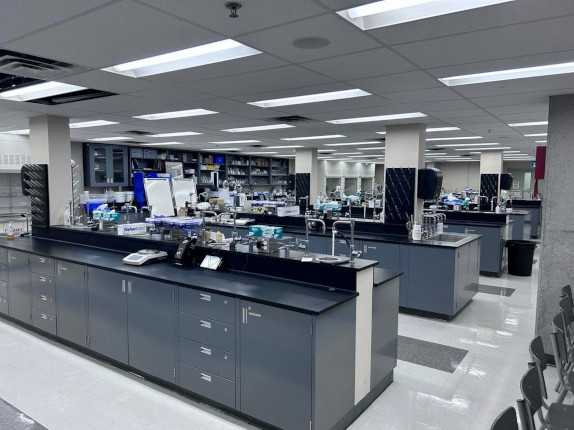 First Year Lab
First Year Lab
The cutting-edge undergraduate laboratories, which were newly renovated in 2018, are used in the development of practical, hands-on laboratory skills.
Our labs ensure that the students work in an efficient, modern and very safe environment. Check out the photo gallery below that showcases our lab equipment that fosters hands-on experiential learning.
Outside of the regular courses of instruction, when the equipment is idle, some instruments can be accessed by researchers provided that the user has obtained adequate training.
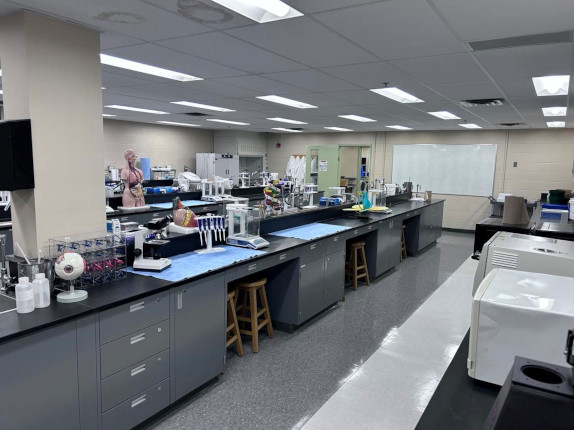 Biology Lab
Biology Lab
The Biology Laboratory is a common space used by the undergraduate students who have enrolled to take the life science courses during their time at RMC. The courses included are the biology of organism lab and the biotechnology lab. Here students will learn about varying subject covering the biological functions of plants as well as micro and macro-organism. With a variety of well-designed labs students will get to experience how bacteria function and react in different environments, learn anatomy with the fetal pig dissection and how plants develop over time. The lab is equipped with all the protective gear needed to guarantee student safety as well as plenty of glassware, pipettes and microscopes for students use.
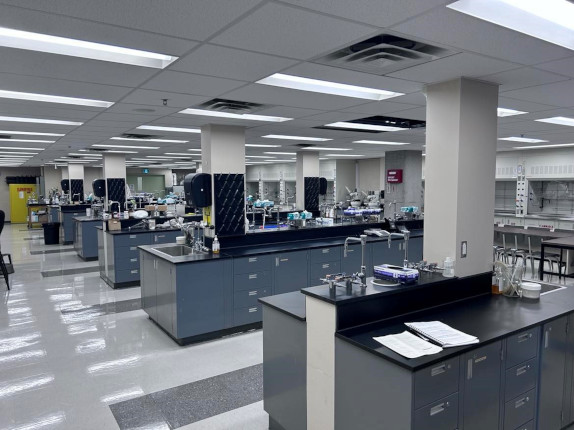 Organic Lab
Organic Lab
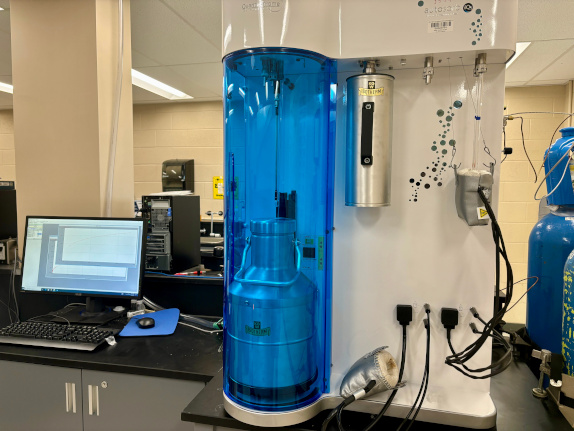 Volumetric Gas Adsorption Analyzer
Volumetric Gas Adsorption Analyzer
The Quantachrome Autosorb iQ3 is a 3 sample port system that is capable of characterizing porous materials by multi-point BET surface area determination, pore size distribution range, and pure component gas volumetric adsorption under a range of temperatures and pressures.
Personnel can be trained to use the Quanta or have the analysis completed by trained staff. Non-RMC personnel can contact Dr. Kennedy with inquiries about the analysis.
Contact Information:
Dr. Dean Kennedy
Email:dean.kennedy@rmc-cmr.ca
Phone: 613-541-6000 ext 6049, CSN: 271-6049
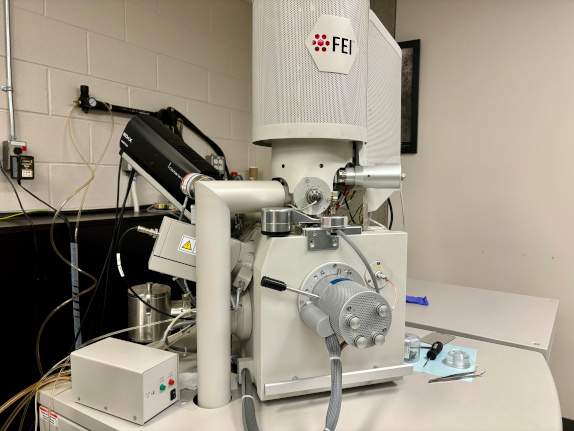 Scanning Electron Microscope
Scanning Electron Microscope
The Quanta 250 environmental SEM is capable of imaging micro- and nanostructures with a variety of detectors for both secondary and backscattered electrons. The SEM is equipped with an EDAX EDS detector for elemental x-ray analysis.
Personnel can be trained to use the Quanta or have the analysis done by the SEM technologist. Non-RMC personnel can contact Dr. Snelgrove with inquiries about the analysis.
Contact Information:
Dr. Jennifer SnelgroveEmail:jennifer.snelgrove@rmc-cmr.ca
Phone: 1-613-541-6000 ext 6053, CSN: 271-6053
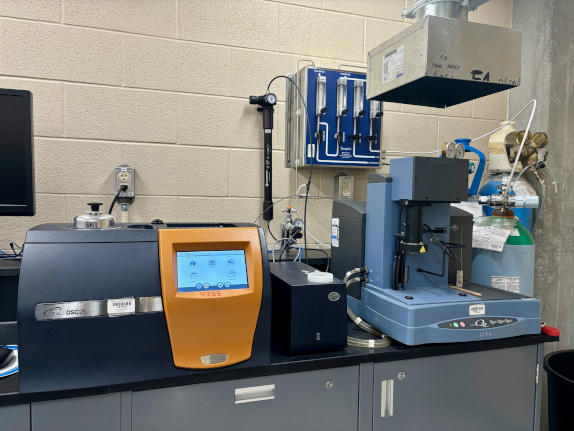 Thermal Analyzers
Thermal Analyzers
Differential Scanning Calorimeter (DSC)
The TA Instruments Discovery DSC 25 measures temperatures and heat flows associated with thermal transitions as a function of time and temperature.
Thermalgravimetric Analyzer (TGA)
The TA Instruments Q50 TGA is capable of measuring mass change with a precision of +/-0.01% with set heating rates fo 0.1 to 100oC/min to temperatures of up to 1000oC. The system is capable of controlling flow under pure and mixture gas conditions.
Personnel and students can be trained to use these instruments for research purposes. Non-RMC personnel can contact Dr. Snelgrove with inquiries about the analysis.
Contact Information:
Dr. Jennifer SnelgroveEmail:jennifer.snelgrove@rmc-cmr.ca
Phone: 1-613-541-6000 ext 6053, CSN: 271-6053
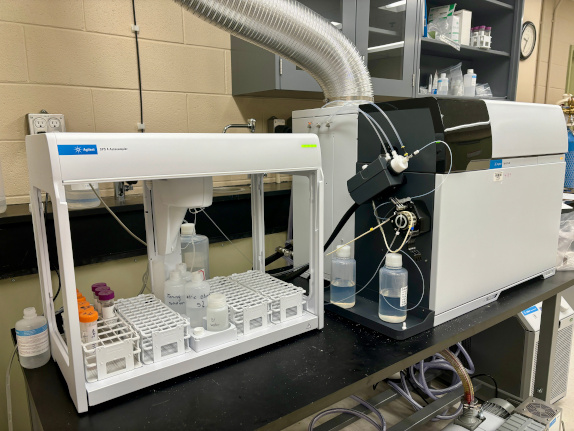 Mass Spectrometer
Mass Spectrometer
This Agilent 7850 quadrupole ICP-MS instrument performs multi-elemental trace level analysis with wide dynamic range, high matrix tolerance, and effective control of polyatomic interferences.
Personnel and students can be trained to use this instrument for research purposes. Non-RMC personnel can contact Dr. Samuleev with inquiries about the analysis.
Contact Information:
Dr. Frank ZemanEmail: frank.zeman@rmc-cmr.ca
Phone: 613-541-6000 ext 6272, CSN: 271-6272
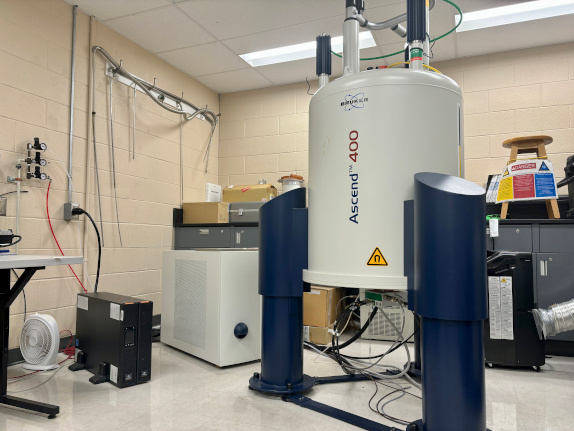 Nuclear Magnetic Resonance
Nuclear Magnetic Resonance
The Avance III HD 400MHz Bruker Nuclear Magnetic Resonance instrument is equipped with multinuclear broadband Fluorine Observe Smart Probe (5 mm sample diameter) with digital tuning. It is capable of running various 1D analyses such as: 1H NMR, 13C NMR, 19F NMR, 15N NMR, and 31P NMR (with 1H decoupling capability) as well as 2D experiments such as: COSY, HETCOR, HSQC and HMBC etc. The high temperature analyses can be performed up to 150°C using Bruker Smart Variable Temperature (BSVT) control unit, with digital control module for various polymeric and glass samples.
RMC personnel can be trained to run their analyses or have the analysis done by the NMR technologist. Non-RMC personnel can contact Dr. Bavarian with inquiries about the analysis.
Contact Information:
Dr. Neda BavarianEmail:neda.bavarian@rmc-cmr.ca
Phone: 613-541-6000 ext 6051, CSN: 271-6051
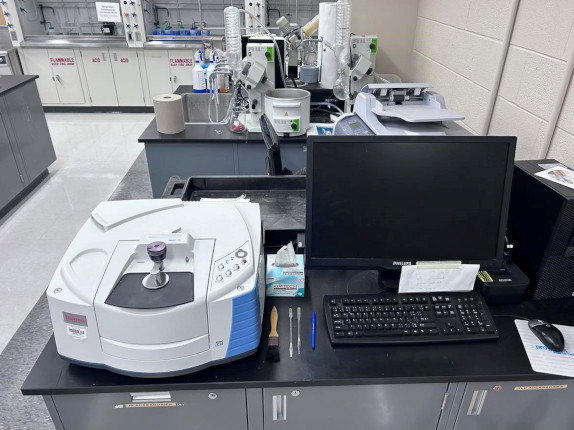 FTIR Spectrometer
FTIR Spectrometer
Located in the organic chemistry lab the FT-IR spectrometer is often used by the undergraduate students, who after having completed the synthesis of their compounds, utilize the machine to characterize their samples. The spectrometer is capable of producing a spectrum indicating the different chemicals and bonds present in a sample. It does so by exposing it to an infrared beam, this causes the sample to emit specific energy signals correlated to the compounds and bonds present in the samples. This creates a spectrum based on the intensity of the energy signals over the wavelength of the beam. Using this data the students are able to determine if their samples correspond with what they intended to synthesize.
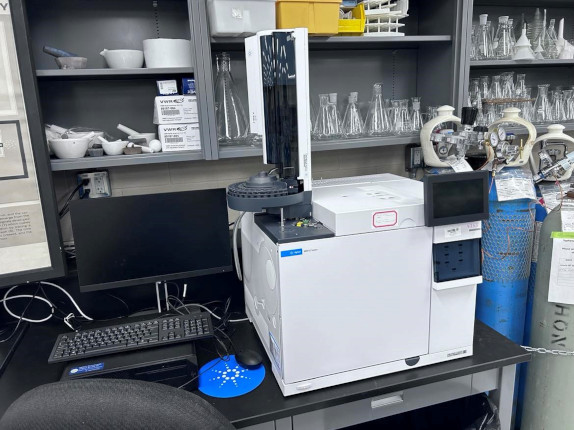 GC/MS
GC/MS
Located in the organic chemistry lab the Agilent 8890 is the residential gas chromatography machine used by students and staff for chemical characterization. This analytical technique can determine the presence or absence of the different elements in a volatile sample well also providing their ratios. This functions by passing the gas through 2 phases, the mobile and stationary phase. The phases affect the time it takes for certain molecules to be pick up by the GC’s detectors. Based on that info the GC is able to create a graph which indicate the intensity of the detect molecules over time. This identifies which molecules are present in the sample as each one has a specific retention time. Thus, the intensity at a set time determines what molecule is present and how much of the samples composition it comprises.
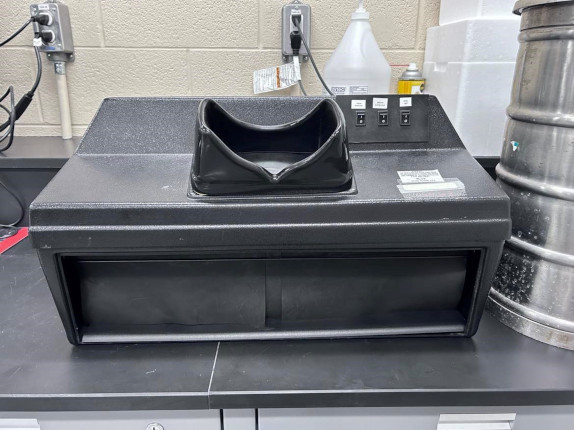 High Performance UV Cabinet
High Performance UV Cabinet
Located in the biology laboratory the cabinet provide a dark environment which can be used to observe different materials and contaminants. The comfortable soft rubber viewport utilizes a contrast control viewing filter. This filter protects the eyes from harmful shortwave radiation and blocks the "blue haze" associated with longwave UV.
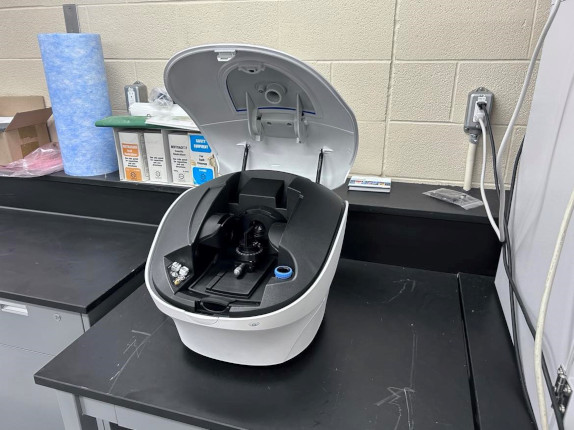 Fluorescence and Absorbance Spectrometer
Fluorescence and Absorbance Spectrometer
Located in the biology laboratory the Duetta is a dual capable spectrometer allowing for measurements of any materials absorbance or fluorescence, which can be done either simultaneously or separately as needed. Due to the Duetta high speed and advanced detectors it’s able to acquire a full spectrum from 250nm to 1100nm in an instant. The device is also designed with automatic real-time inner filter effect correction which helps combat a loss of observed fluorescence caused by the absorption of light by the tested sample. This help prevent primary and secondary IFE, giving true molecular fingerprints with simultaneous measurement.
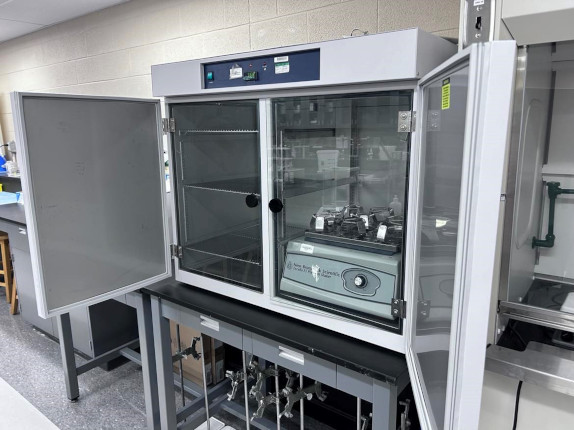 Gravity Convection Incubator
Gravity Convection Incubator
Located in the biology laboratory, the incubator provides a reliable heated environment with a consistent airflow ideal for delicate samples, microbiology, bacterial research, as well as food and beverage testing. The incubator also features microprocessor temperature controls, allowing you to set the units in 0.1°C increments up to 75°C. The gravity convection feature distribute heat to the chamber without a blower to minimize sample dry-out and maintains temperature within tolerances of ±3°C. This Built-in safety exist in case main controller fails.
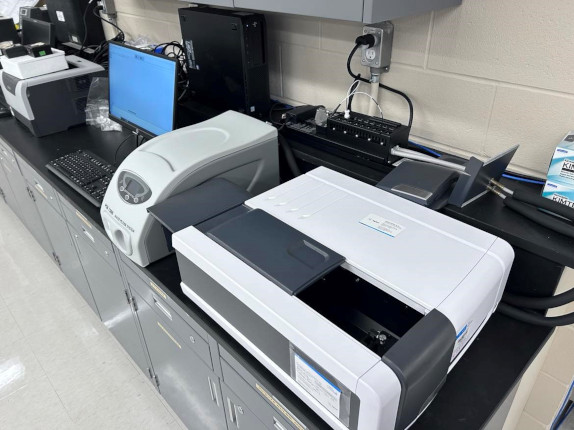 Cary 60 UV-Vis spectrophotometer
Cary 60 UV-Vis spectrophotometer
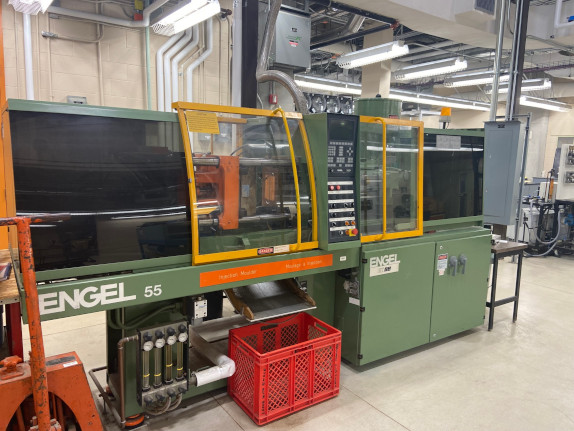 Injection Moulder
Injection Moulder
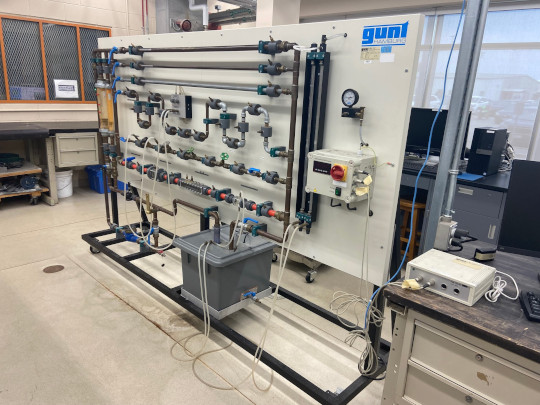 Fluid Flow
Fluid Flow
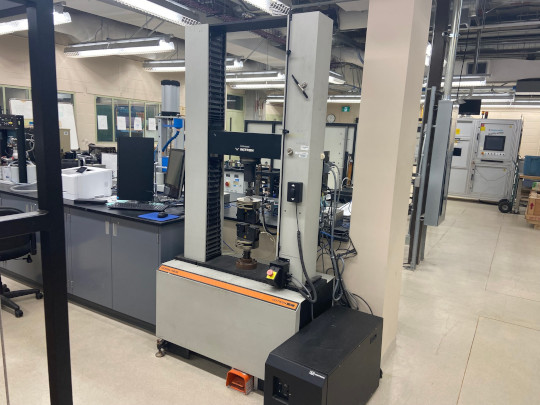 Instron
Instron
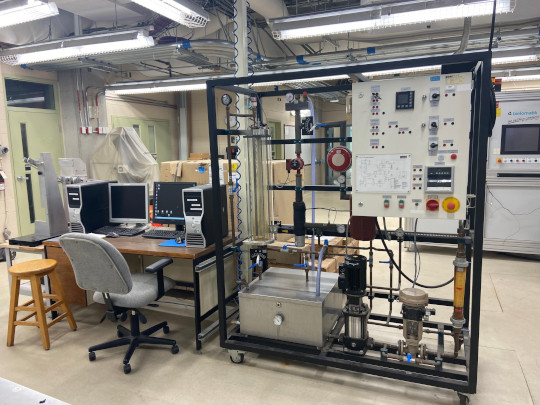 Process Control
Process Control
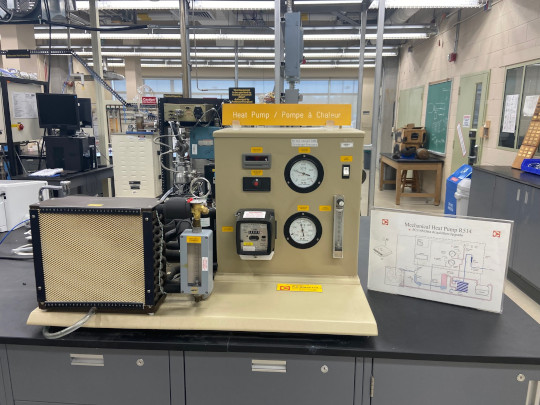 Heat Pump
Heat Pump
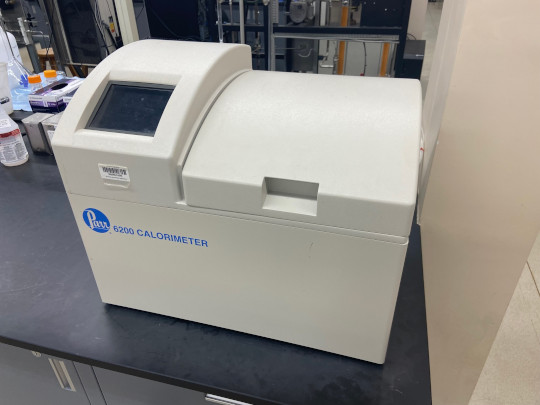 Bomb Calorimeter
Bomb Calorimeter
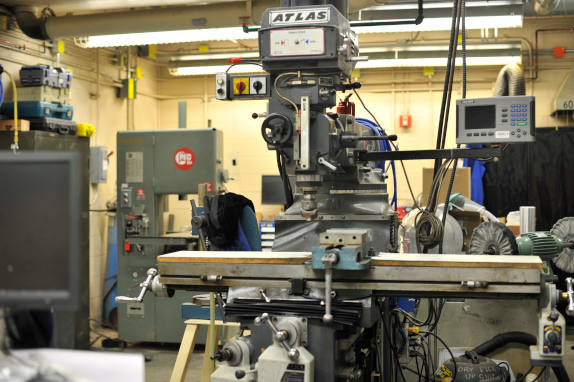 Mechanical Shop
Mechanical Shop
The Chemistry and Chemical Engineering mechanical shop offers a broad range of machine shop services that support undergraduate and graduate students. Some of the services include feasibility evaluation, conception, development, production, planning, and fabrication of experimental prototypes or scientific mechanical components.
Expertise is available in the following areas:
- Precision machining and sheet metal fabrication
- Cad Cam programming
- CNC Mill and lathe capability
- Rapid prototyping (3D Printer)
- Laser cutting and engraving
- Specialised welding techniques
- Laboratory vacuum systems design and repair
- High pressure systems and helium leak testing
- Scientific equipment installation and maintenance
- Lab equipment service and repair
Contact Information:
Clarence McEwenEmail: clarence.mcewen@rmc-cmr.ca
Phone: 613-541-6000 ext 6606, CSN: 271-6606
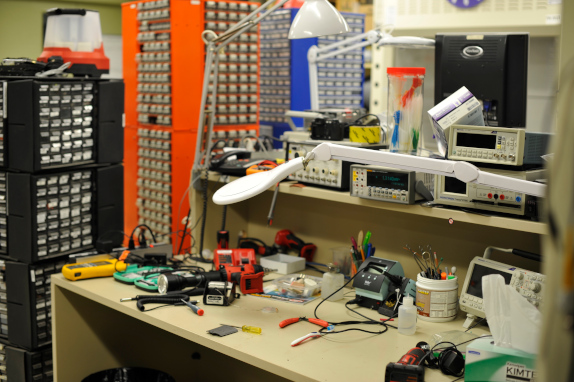 Electronic Shop
Electronic Shop
The Electronics Shop in the Chemisty and Chemical Engineering Department offers service and repair to equipment and electronic devices that support undergraduate and graduate research. Some of the services include planning, design, development, prototyping and end product.
Services Provided
- Repair of all laboratory equipment
- Design and manufacture of custom laboratory equipment
- Computer repairs and upgrades to both hardware and software
- Electronic diagnostics and component level repairs
Contact Information:
Michael Libbey-GriffinEmail: michael.libbey-griffin@rmc-cmr.ca
Phone: 613-541-6000 ext 3711, CSN: 271-3711
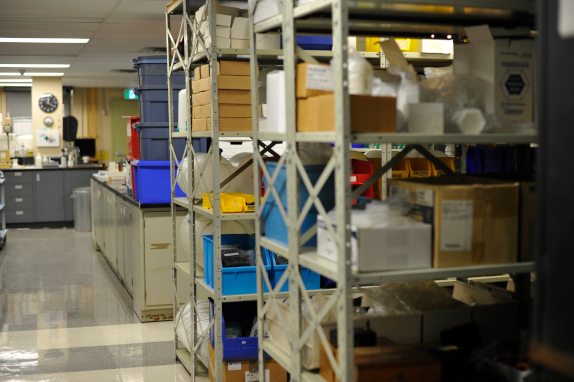 Chemical Storeroom
Chemical Storeroom
The Chemical Storeroom maintains a stock of commonly used chemicals, solvents and laboratory supplies and consumables required for teaching laboratories and research.
Contact Information:
Dave TwiggEmail: dave.twigg@rmc-cmr.ca
Phone: 613-541-6000 ext 3890, CSN: 271-3890